BT Plug FTTC as UK Hit 7th Place in the Global Networked Readiness Index
The World Economic Forum has released its annual Global Information Technology Report 2013, which ranks 144 countries by their information and communication technologies (ICTs) capability and includes a lengthy defence of FTTC by BT. A strong broadband market is also one of many factors that push the United Kingdom up three places to rank 7th overall.
The extensive 409 page report is easily one of the most comprehensive assessments of the impact of ICT on competitiveness, growth and a population’s well-being. It also goes far beyond yesterday’s Social Progress Index (here), which incidentally ranked the UK 2nd out of 50 top countries.
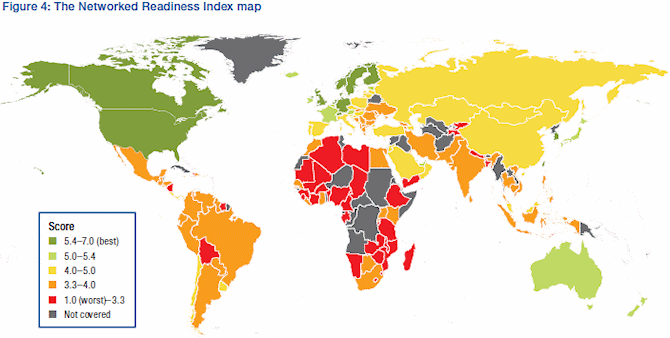
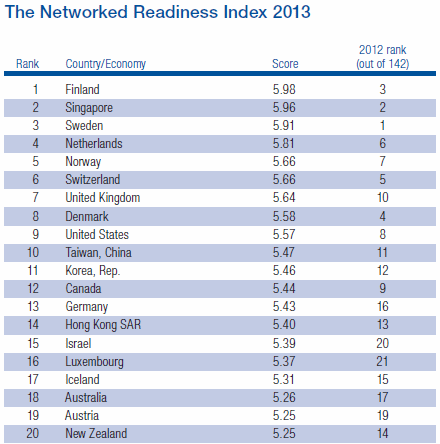
The ITR2013 also looks at consumer broadband ISP speeds, uptake, price and government investment. As with yesterday’s SPI, the ITR2013 finds that broadband and internet access provision remain one of the United Kingdom’s strongest areas.
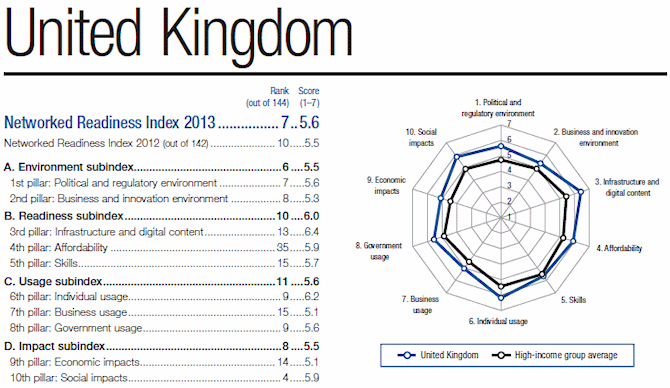
The report also extensively quotes BT’s Strategy Director, Sean Williams, whom explains how superfast fibre optic broadband has the potential to drive social and economic growth and help create jobs. Williams states that the issue is not whether fibre can help drive social and economic growth, but how the vision of coverage as close as possible to 100% can be achieved.
Naturally BT doesn’t miss the opportunity to plug its own up to 80Mbps capable hybrid-fibre FTTC solution and compares it with the pros and cons of choosing a fully fibre optic 330Mbps+ capable FTTP network instead. As usual they come out in favour of the cheaper but slower FTTC product.
Sean Williams, BT’s Strategy Director, said:
“Arguably, a pure fibre infrastructure—where a fibre connection is provided to every subscribing premise (FTTP, also known as FTTx or FTT-home/-premise/-subscriber) is unlikely ever to be capacity-constrained because operators can simply add wavelengths to increase capacity if needed. However, the economic costs of universal FTTP delivery are prohibitive.
Where insufficient funding for the universal deployment of FTTP but an established copper telephone infrastructure exists, then FTTC makes economic sense because it leverages assets already in place, minimizes local disruption during rollout, and avoids the most expensive and complex replacement of individual connections to individual premises while still delivering very high broadband speeds.
Dogmatic attachment to FTTP as the only technology solution appropriate for fibre networks is actually a barrier to investing in fibre broadband because it massively increases the cost and disruption, undermines the business case, and thus delays deployment.
The criticism levelled at FTTC is that it is not future-proofed. Further expenditure will be incurred in the future to upgrade the network to FTTP as demand for bandwidth increases. However, experience has shown that there is plenty of headroom in FTTC technology for bandwidth increases.”
Williams goes on to point out how various FTTC related technology developments, such as vectoring, profile changes, bonding and the ITU’s related project G.fast, could eventually “deliver over 200 Mb/s on FTTC” lines (you might even get 500Mbps or more but only if you live super-close to your street cabinet). As usual FTTC’s reliance on a “last mile” copper line run means that it’s still a distance dependent technology and few operators like to acknowledge the poor performance for those who live further away.
Interestingly Williams also claims that “additional private investment could bring fibre broadband delivering 80Mb/s to 90 percent of the United Kingdom by the end of 2017“, although we note how the crucial phrase “up to” has been left out of that sentence. No doubt FTTC is very good medium term solution for most people, although it does have its limits and we’d rather wish that operators would promote the reality of speed vs distance instead of just quoting the headline figures.
Global Information Technology Report 2013
http://www.weforum.org/../global-information-technology-report-2013/
Mark is a professional technology writer, IT consultant and computer engineer from Dorset (England), he also founded ISPreview in 1999 and enjoys analysing the latest telecoms and broadband developments. Find me on X (Twitter), Mastodon, Facebook and Linkedin.
« Xchanging Deploys FREE Open WiFi in the City of London UK
Latest UK ISP News
- FTTP (5512)
- BT (3514)
- Politics (2535)
- Openreach (2297)
- Business (2261)
- Building Digital UK (2243)
- FTTC (2043)
- Mobile Broadband (1972)
- Statistics (1788)
- 4G (1663)
- Virgin Media (1619)
- Ofcom Regulation (1460)
- Fibre Optic (1394)
- Wireless Internet (1389)
- FTTH (1381)




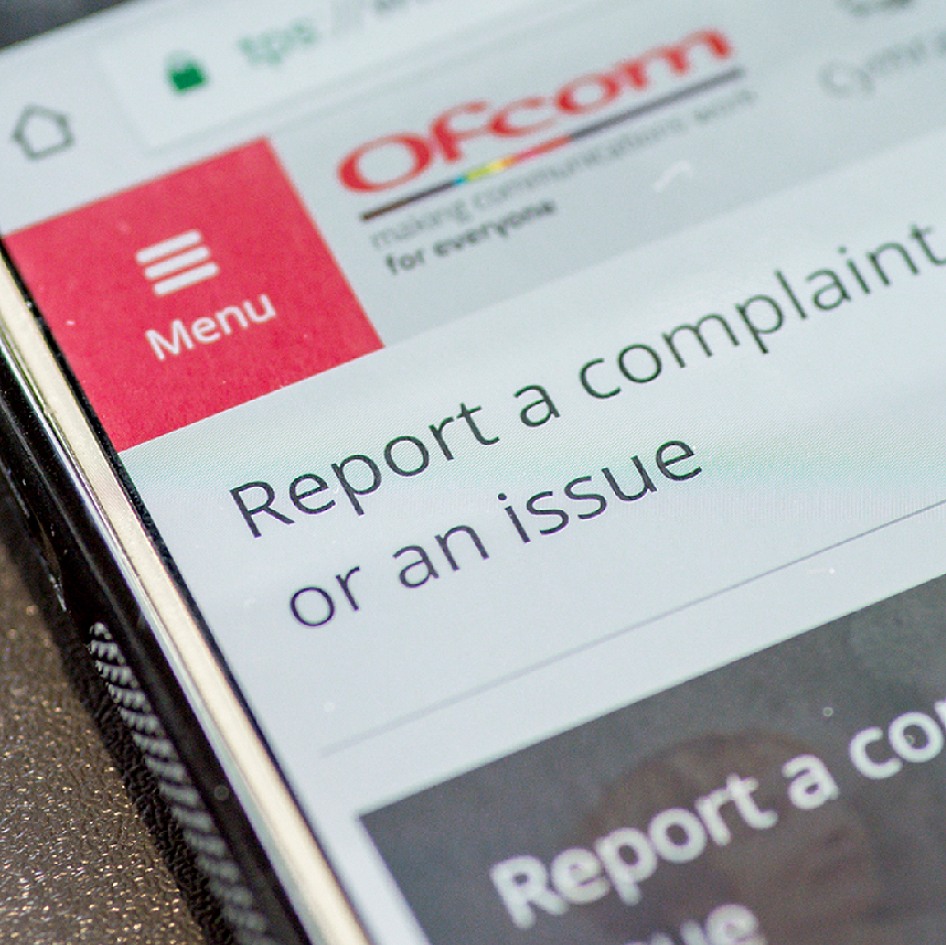
















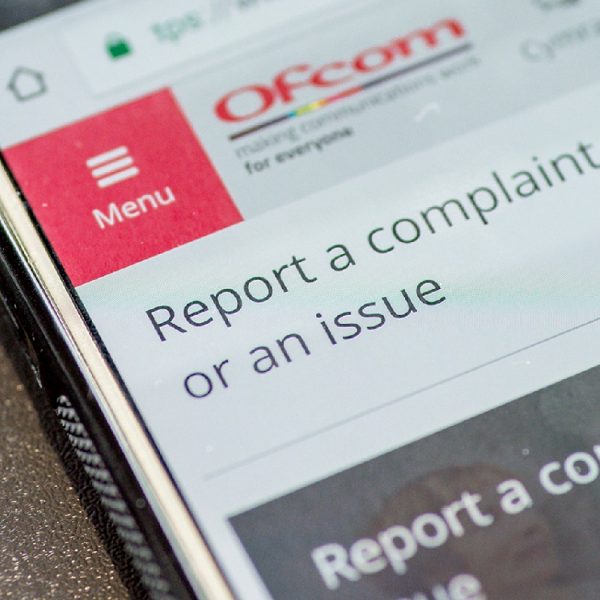


































Comments are closed